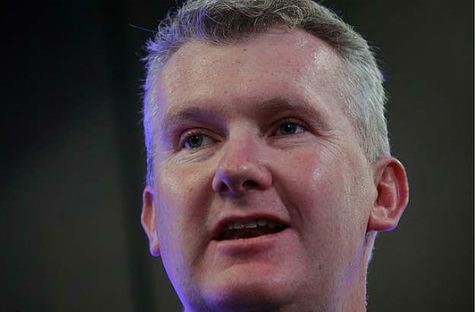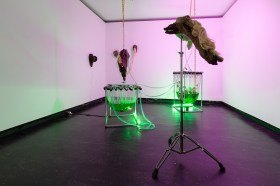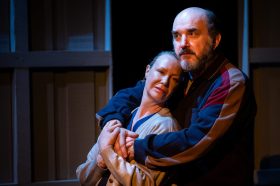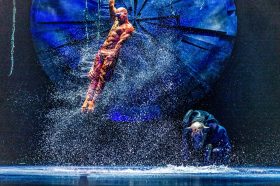The Minister for the Arts, Tony Burke, went on the attack with this speech at the Western Sydney Arts Forum on Monday.
Thanks so much. I want to acknowledge, I know Jacinta’s not here now but I do want to acknowledge that extraordinary Welcome to Country and acknowledge elders past and present.
My parliamentary colleague and long term friend Nathan Rees, former Premier, former Minister for the Arts, George Souris, who I repeatedly see at functions that we both attend as Minster for the Arts, and Councillor Kelly, who has known me from long before I became a Member of Parliament. It was wonderful to be able to both hear that introduction but also know the history of the building that we are in today. I’m very grateful for the organisers of today for WSROC to be putting this on.
And there will be a normal expectation, middle of an election campaign, government funded, there will be some quick announcement, quick thing to say, over the last six years, here is the bit we have forgotten, we are about to announce it.
I’m not going to do that and I want to explain why. Because in policy for the arts, there is an issue which from what we saw in parliamentary debate some weeks ago now will actually be a very significant point of difference in the election that’s coming up and I want to explain why as Minister I fall on the side of that argument that I do.
And it goes back to a reform that goes all the way back to the Whitlam Government, and it’s a reform about whether funding for the arts at a national level should be by government decree or whether it should be at arm’s length through a peer review process with the Australia Council.
It’s always easier, the politics is always easier as a politician to say well the Minister should just be in charge of everything, and for all the different parts of the funding to be something that the Minister has their direct fingerprints over, over what happens.
Of course to do that would be the opposite of what you can logically regard as good arts policy. Good arts policy is when you actually want creativity to be able to take its own path, and there are massive benefits when you allow that to happen.
But that’s why the Australia Council both under its former structure and under its new structure remains a funding body that does its funding at arm’s length.
We have an extensive peer review process, but effectively what you never want, you never want to have a situation where the federal Minister is effectively applying a line item veto over which artistic projects should be funded and which should not, over what sort of artistic endeavour should be approved, and what should not.
Because by its very definition, creativity, if you believe creativity matters, as part of a life blood for what a society can provide, then you’ve got to be willing to separate it from politics.
Now as a politician, that actually carries some challenges. It means there are no shortages of arts events I will go to where there will be somebody who either wins an award or an artistic even that we have funded where part of the event itself is the bagging out of me or my policies. And you’ve got to be willing to be on for that, if you’re serious about creativity being something that will be not stifled by politics.
We had the Prime Minister’s Literary Awards last week in Brisbane, it was interesting holding them in Brisbane, the first action of the Queensland Premier when he came to office was to abolish the equivalent Premier’s literary awards in Queensland, but we had the Prime Minister’s Literary Awards there.
And the final person to win then stood up and decided to give a speech getting stuck into the immigration policies of the Government. I think that should be a fair call, I don’t think that should be something where someone stands up and is afraid that there might be a hit at funding as result of doing that.
Why do I point to this? Because when we had the amendments to the Australia Council, there was an amendment put by my opponents in the Parliament, by George Brandis himself who will be speaking to you later today, where he directly moved the amendment to make it that the Minster would be able to direct the Australia Council on any matter whatsoever, and the ministerial direction would override the board.
If that amendment had been carried, right now, I would have a hell of a lot of power over a whole lot of money, and it would have been a terrible outcome for the arts. And it’s something that would undermine the entire reform process of the Australia Council, ever since its inception.
If you believe in creativity, and I do, then arm’s length funding matters.
It matters that people with their creativity pathway is that they want to get stuck into something that’s controversial then they should be allowed to do so. And the only limit on whether or not they are being funded should be whether or not, in terms of peer review, whether it stacks up as an artistic endeavour.
If the arts value of it doesn’t stack up then it won’t get funding under peer review, but it should be an artistic process not a political process.
When Simon Crean came down with the cultural policy, Creative Australia, it was something that we had promised for a long time, and a whole lot of people wanted to go straight to what was the money, and yes there was more, there was a lot more. Some people wanted to go directly to what jobs might come from it, and significant employment has come from it, in particular in the film industry, that those Australia Council grants as they go out will see jobs across the board.
But the most important thing, there was a wonderful article that went out at the time by Jonathan Biggins, where he said the most important thing in a cultural policy isn’t the money or the policy structure itself, it’s the conversation that we start.
And the conversation that was started was based on the five pillars, five pillars which I believe do form and establish what cultural policy in Australia should represent. Those five pillars, the foundation one, was our Indigenous heritage. The second one, our diversity. The third, the centrality of the artist. The fourth, the importance of getting your institutional structures right, and the fifth, the fact that we need to go to new media, including digital, not merely as way of supporting creative endeavour here within Australia, but as a way of making sure that our artistic endeavour is able to reach the world, particularly in the context of engagement with Asia.
Now, like you, I live in a multicultural community, and I was so pleased during the Welcome to Country it was acknowledged that Australia has indeed been a multicultural nation since the first sunrise.
I think one of the greatest of late contributions to understanding multicultural Australia was a production that started out here. The Baulkham Hills African Ladies Troop I think is an extraordinary piece of theatre, and I’m very proud that we have a production now where it started out here, it was first performed at the Riverside Parramatta, and ends up going to Belvoir at the end of its life.
And I think that speaks volumes from what we can get when you actually allow artistic endeavour to follow its own path. For those of you who haven’t seen it, extraordinary play, it moves between documentary and drama, back and forth between the two. Half the cast are professional performers and actors, the other half are the actual women telling their own stories as refugees from Africa, and when they get to some of the most confronting parts of their own stories they defer to the cast to be able to tell the rest of it.
By definition it’s a production that won’t be able to performed again and again in years to come because part of the drama is that we are watching the actual original cast members tell their own stories on stage.
That sort of creativity would not be available in my view if you had a right of veto from the Minister. I think it is one of the most fundamental decisions points in arts policies that I have seen. Do we actually want to go down the path of having ministerial directive instead of arm’s length funding for the arts.
Now there is an overarching view of the arts where I was hoping to be able to have some engagement. Originally myself and my opposite number were going to be here at the same time which I thought would have been great because I would have been able to respond in some way to the things he says about me when I’m not in the room. As it turns out, I now, when he speaks, I won’t be in the room. I will actually be on a plane across to Indonesia for a conference on people smuggling that President Yudhoyono is holding tomorrow.
So while I want to focus, and I will get back to it, on the actual approach of this government to arts policy, there is something that keeps being said about me that is actually fundamentally wrong, so I just want to get in first so if you hear it the light bulbs can go off later this afternoon.
And it’s this. There is a consistent argument that for some reason, I don’t understand why, has been put by my opponent, that for Labor, arts funding is only important if you can establish another reason for it. If you can establish a social adjustment that you are trying to bring about or if you can establish the jobs and it’s never about important for its own right.
I actually believe the exact opposite of that and I have expressed that in pretty much every speech I have ever given as Minster. Why someone would be hell-bent on making stuff up so that they can then oppose it, is beyond me. Now that I have mentioned it you might not hear it this afternoon. But it’s been in comment after comment publicly.
My view is that creativity matters in its own right. That’s why I don’t want ministerial intervention. My view is that the stories themselves don’t even have to be Australian. The story of creativity is itself an Australian story. When I see Gatsby as a film, while we have a couple of the lead roles taken by Americans and we are talking about quintessentially an American novel and the play itself is set in the United States, I see Baz Luhrmann, Catherine Martin and Australian creativity all over that film.
But added to that, when you allow creativity to go down its own path and some of the stories that are told will be Australian. Some of the stories will be Australian creativity telling the story of elsewhere and as part of the expat experience that we increasingly have with so many Australians living overseas for part of their lives, we are probably going to tell more stories that are affected by overseas.
Those Australian stories that end up being told are really important. And some of them will be confronting. But all of them by virtue of being told, means that we are building layer after layer of Australian culture improving our understanding of each other and improving the world’s understanding of us.
There will be some things where there is no story. There will be visual art where there are intellectual challenges with it that grab you the moment you glance at it. But don’t actually tell a story and there will be some visual art that tells a story of a particular event. Or of story lines and song lines that are rooted deeply in the Australian landscape and history.
In the same way there will be music, some music that tells a story like the song that we heard in the Welcome to Country and there will be some music that is just beautiful in its own right. And all of that builds the layer that only cultural activity, that only artistic endeavour is able to tell. But one of the things that I think is most exciting is as a multicultural society, it means that whether we try to or not, we are not simply celebrating different forms of heritage, we are actually creating new art that can be created nowhere other than Australia.
A few weeks ago I started for the first time an annual set of awards, the engagement of Australian arts into Asia. The most exciting thing with that is that there are no instances where we have simply taken Australian art off the shelf, put it in a room in different parts of Asia and said this is Australia ‘go figure’. What we have done and what our artists have done without the heavy hand of Government telling them what to do, has actually been to go out and create new art. To go out and create art that wouldn’t have happened in Australia on its own, it wouldn’t have happened in Asia on its own, but happens because of the multicultural engagement and the cross national engagement that we have.
So for all of this, what I am articulating this morning, rather than a quick announcement, rather than a quick cheque, is to announce an approach which is believe is fundamentally different to what will be offered later today. You will get from each side of politics that we all support the arts. You will get from each side of politics at a federal level, the argument that money is required and you get an argument about how much money and if the speculation about cuts in the arts sector is accurate as to what my opponents will be announcing in the course of the next couple of weeks then I guess we get to say, we support the arts and there should be more of it and they get to say they should support the arts and there should be less of it.
But the most important I believe is the approach. I don’t understand when we have a sporting program where we fund sporting champions from our schools and our youth to compete around the world that that gets bipartisan support and when you do the same thing for artists, it becomes a source of political contention. I don’t understand that and I love sport, I am not knocking that in any way, and even if I hadn’t had the lifelong engagement with the arts that I have had through theatre and music and poetry.
I think it would still be the case, still be the case that I would have deep understanding, particularly because I come from a multicultural area, deep understanding of the fact that there is a sustenance and a creativity that the arts deliver that actually doesn’t just change or affect the fabric of the nation, but in many ways is the fabric of the nation.
I don’t ever want to see that to be something that turns into the cocktail and grab bag of the whim of an individual minster from day to day. The moment we do that, and there are some countries which have had complete control of Government minsters putting their rubber stamp on what arts events are allowed and what are not, I don’t want to compare us to those sorts of countries.
The line item veto that was moved in the parliament, I believe, was the most fundamental change to the structure of federal funding and federal support for the arts we have ever seen. I want you to know that performances you see here, the performances which are and visual exhibitions and different forms or art, all the different arts forms that are celebrated throughout our country, in particular in Western Sydney, should occur because they have artistic merit, should occur because they affect the fabric of our area, should occur because they enrich us. And anybody who wants to say the should occur because the minister is kind enough to permit them, is someone who I believe, I am right to stand opposed to.
It might seem too philosophical, it might seem a bit away from the retail politics you could expect at this time, but if you believe peer review matters and if you believe arm’s length funding matters. If you believe the growth in the artistic sector that we have seen over the last couple of generations has enriched us, then you will understand why I have given the speech the focus that I have.
It’s a pleasure to be with you.
(Pictured: Tony Burke)





